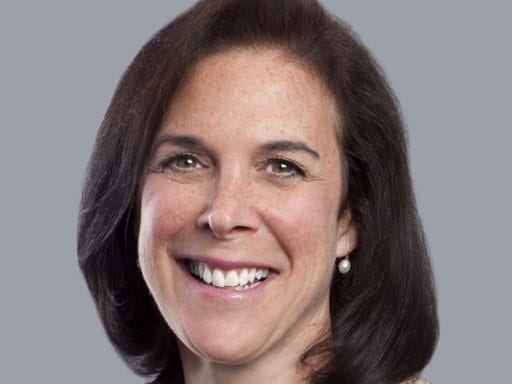Young people starting careers are mindful that in the past many women with MBAs and other professional degrees decided to “opt out” midcareer, and then decided they wanted to return to work. A 2010 survey of 3,700 women by the Working Mother Research Institute found widespread work-life disconnection: 55 percent of career-oriented stay-at-home moms surveyed said they would prefer to be working.
With that in mind, I spoke with Madelyn Miller, W’79, managing director and financial advisor at JP MorganChase & Co., about her successful re-entry to the workforce six years ago after 14 years as a stay-at-home mom. When she was at Wharton, only 10 percent of her class was female and she was one of the founders of Wharton Women. She is passionate about helping young women manage their career goals while maintaining a work-life balance, and she has advice for women eager to return to work after taking time off.
JANE BARNET: You were an Accounting and Finance major at Wharton undergrad. Can you talk about your early career?
MADELYN MILLER: I never intended to practice as a CPA but I thought it would be a great springboard to anything else I wanted to do. I passed my CPA exams during my senior year of college and worked for two years at Price Waterhouse in audit, tax and consulting before starting at Harvard Business School. After Harvard, I worked in corporate finance at Salomon Brothers.
When they asked me to go into mergers and acquisitions, I was already married—I was married at 21—and I looked around at the women and noticed that they were either single or divorced. I decided that I would not stay there long term because I wouldn’t be able to keep the right balance between my personal life and my professional life. So I migrated to real estate finance, real estate syndications and development, and then investment.
I worked for a corporate office developer for a number of years before my husband accepted a job in Paris. I was the trailing spouse and had to find work. I got a job in the real estate investment area of a large quasi-governmental organization that manages the pension assets of French postal workers, and I did that during our stay in France.
I never wanted to have children. I was always very interested in my career, very ambitious. My mother was a stay-at-home mother and I thought the only way to be a good mother was to be a stay-at-home-mother. Being far from home really put me [in the mindset] that we might want to have children. We were married for 14 years and I finally thought, “I think I can stay home with children.” Again, I thought the only way to be a mother was to stay home. I had my first child in France, and we decided to come home because we didn’t want to be away from our extended family with our children not knowing their grandparents. After two failed attempts at purchasing an apartment in Manhattan, we moved to Princeton, N.J., and I had my second child there.
JB: How did you find staying at home with children?
MM: I loved my children but I found the transition very difficult. I had been a career person and now I was at home with a baby in the suburbs. Since I was determined to make it work, I did everything I could. I was on the board of trustees of their schools and did a lot of volunteer work. After a number of years, I found I was at their schools too much, especially as they were getting older. So I knew I had to pull back, but I really needed more.
That’s when I turned to my husband and said I needed to change the situation. I needed to move back to the city because that’s where the jobs are. I got the kids on board. At that point they were adolescents and I knew it had to be their decision in order to make it work. We moved in the summer of 2007, I got the kids acclimated in the fall and I planned to put my resume together over the winter holiday.
JB: Did you have a strategy for re-entering the workforce? Had you kept up with your business colleagues? Your Wharton and HBS contacts?
MM: No, because when I left I never intended to go back. I thought I was done. Had I known then what I know now, I would have handled it very differently. There weren’t a lot of programs offering help for going back, but somebody told me about a headhunter who wanted to help people re-enter the career force. I discussed my situation with him, I think he was impressed with my story because I completely changed my life so that I could go back to work. My background was in commercial real estate, but this was 2007 and it was not a good time for real estate. [The headhunter] asked me if I had thought about wealth management. As I thought about the requirements—strong analytical and financial background, likes people, likes to be intimate with people—I thought I could do this because I love being an advisor and helping people with their needs. He put me in touch with Alliance Bernstein and after eight rounds of interviews, I received an offer.
JB: What advice do you have for other women—young women starting careers and older women who are looking to return to work?
MM: I do a lot of speaking to young women and I tell them, “Who you pick to be your partner is the most important decision you will ever make in your life. Not your career, not anything else. If you don’t pick that person who is supportive, it’s going to be very difficult.”
When I returned to work it, was a big change because I did everything for the kids while I was a stay-at-home mother. I work a lot of hours, so the support system I need to have in place is extremely important. I have been blessed with my husband because he has been so supportive at home. When my kids were adolescents, he would prepare dinner and have it ready on the table so when I came home, we could all have dinner together.
I am president of the Harvard Business School Women’s Association, and we do a lot of outreach, including to alumnae who have become stay-at-home moms. We have a newsletter that provides job postings with part-time work. You won’t get paid what you were, but you’re getting back in the game. We did a post-drop-off breakfast in Scarsdale for stay-at-home moms with a nonprofit group that allows women to use their expertise on projects for small businesses. Working without pay on projects gives you a credential to put on your resume. This is my mantra: to help and support women and help women support each other.


























